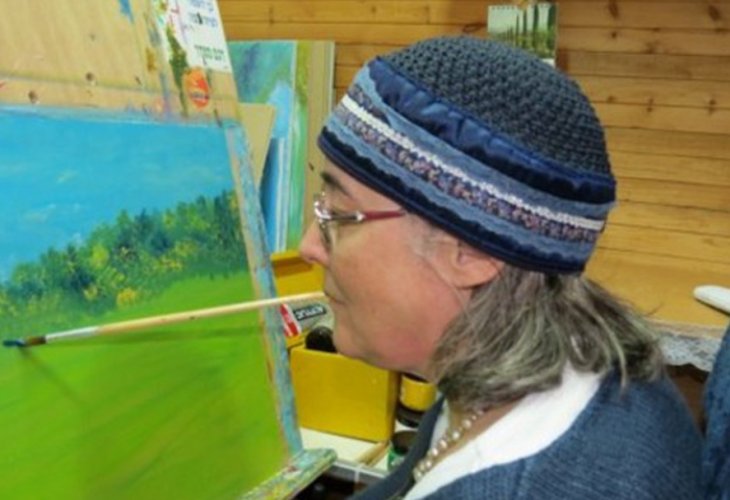Personal Stories
Painting with Her Soul: Bracha Fishel's Journey of Faith and Color
When disability changed everything, she chose to live fully with art, laughter, and a powerful belief that Hashem makes no mistakes

Bracha Fishel’s joy, humor, and strong faith shine through the moment you speak with her. Today, she’s a talented artist who paints with her mouth and shares her story across Israel and around the world. But ten years ago, her life looked very different.
Until 2006, Bracha then a healthy, active wife and mother of three daughters in Tiberias lived a busy and fulfilling life. But out of nowhere, she began experiencing intense pain in her pelvis. Her doctor gave her news that turned her world upside down: she had advanced arthritis and needed low-dose chemotherapy to try to slow it down.
It was the beginning of the Second Lebanon War. Despite the pain, Bracha continued to function with help from an assistant and a pair of crutches. But the pain kept spreading. Eventually, doctors discovered a serious neurological condition pressing on her neck. She was given two choices: either long-term hospitalization or a risky surgery that could leave her paralyzed.
Bracha chose the surgery. “For a woman like me, full of energy, being hospitalized with no end in sight felt like slowly dying,” she said. “I chose life, not the same life I had before, but life with my family, in my home, in my world.”
Unfortunately, the surgery didn’t go as she had hoped. Bracha came home completely disabled and without approval for rehabilitation. Only after a long struggle and the help of a determined physiotherapist did she finally receive approval to go to Tel Hashomer Hospital for therapy.
“I really believed it would be temporary. I told everyone I’d come back after a month with crutches and a new start,” she said. “But after all the testing, it became clear my condition was permanent.”
At first, she was heartbroken. “I cried day and night,” Bracha remembers. “But I wasn’t afraid of dying. My mother, of blessed memory, passed away from cancer when I was 15. She raised us with such strong faith that everything is from Hashem and for the good. She prepared us for the hardest times.”
That deep memory became her strength. But even with that inner anchor, she found herself asking again and again, “Why me?” And then, during one especially emotional night, something changed.
“I felt Hashem whispering to me, ‘Brachale, this isn’t a mistake. I’m not punishing you. I’m helping you.’ Of course, I didn’t understand right away what good could come from this. But I believed that voice, and that feeling still fills me to this day.”
The next morning, her social worker noticed something had shifted. The same woman but with a new glow.
Shortly after, the social worker offered to introduce her to a woman who teaches people with disabilities how to paint and write using their mouths or feet. Bracha, who had always loved art, jumped at the opportunity.
The woman was the mother of a fallen soldier and had dedicated her life to helping others in his memory. When she asked Bracha which hand she used to paint with before, Bracha was confused. The woman explained, “Your head hasn’t changed only your body. The artist is still in you.”
At first, it was messy. “I spilled paint everywhere,” Bracha laughs. “But the nurses never complained.” After a month of practice, she learned how to hold the brush in her mouth. “It was the most beautiful gift I’ve ever received.”
Bracha spent six months in rehab and continued painting at home. Although her home wasn’t equipped for a disabled person, generous friends stepped in. “We’d find anonymous envelopes with money and notes like, ‘You might need this now.’ Hashem has sent us miracles every step of the way.”
She held her first exhibition in 2007 and gave a talk about faith and strength. “I spoke about how Hashem is our loving Father. Everyone has their own package. Our problem is that we think someone else’s is better. But our challenges are tailor-made for us.”
Does she think living in a paralyzed body is ideal? “No, of course not,” she says honestly. “But it doesn’t mean I have to be bitter. Life is about how we look at things. We each have a vessel. Do we fill it with bitterness or with joy?”
She also learned something powerful: asking for help is not a weakness. “At first, I was embarrassed to admit I couldn’t do things on my own. But then a friend told me, ‘When you don’t ask for help, you take away someone else’s chance to do a mitzvah.’ That changed everything.”
Learning to talk openly with Hashem gave her strength and eventually led her to speak publicly as well. Her talks are warm, funny, and full of real-life insight. They’ve touched countless people.
At one point, she even volunteered in the nursing wing of a senior care center. The staff was shocked, she herself was in a wheelchair but all she wanted was to look into the eyes of the women there and say, “There is hope. There is Hashem. Your suffering has a purpose.”
Now, she paints full time and is one of 16 artists in Israel who paint exclusively with their mouths or feet. She’s a member of a global art organization and will soon have her first solo exhibition in Switzerland, her birthplace.
“I used to fight the world,” she says with a smile in her voice. “Now I accept myself and the life Hashem gave me. I don’t wrestle with the world inside me or the one outside. And that is a truly wonderful feeling.”

